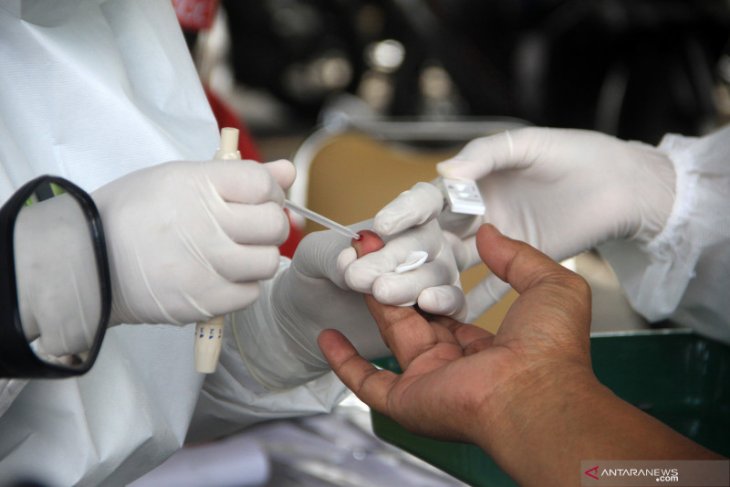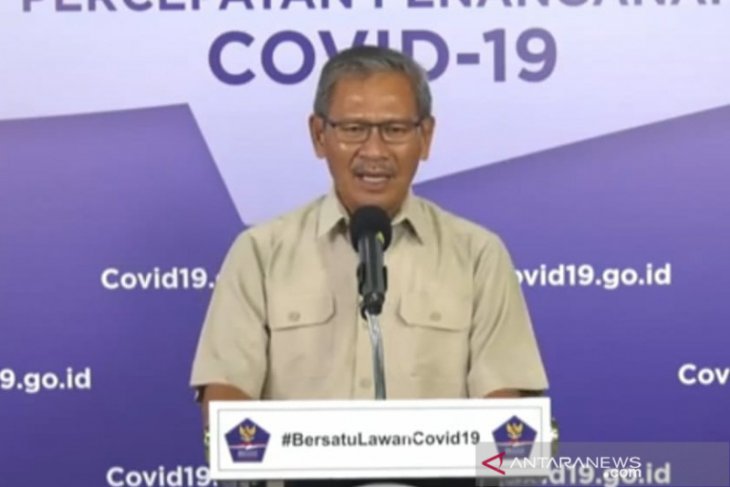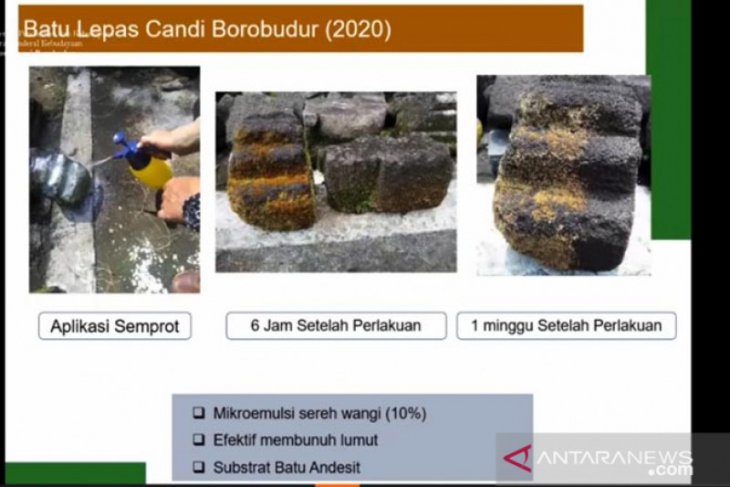Live Streaming
Program Highlight
Company Profile

Ani Hasanah
A number of governors on Tuesday apprised President Joko Widodo of the extent of COVID-19 spread in their areas and mitigation efforts during a limited meeting on the evaluation of large-scale social distancing.
"A number of governors reported to the President about the successes and also the obstacles encountered (in implementing COVID-19 countermeasures such as PSBB in their respective areas),” said the chairman of the Task Force for the Acceleration of COVID-19 Response, Doni Monardo, in Jakarta after attending the virtual meeting led by the President.
Jakarta Governor Anies Baswedan, West Java Governor Ridwan Kamil, West Sumatra Governor Irwan Prayitno, Yogyakarta Governor Sri Sultan Hamengkubuwono X, East Java Governor Khofifah Indar Parawansa, Central Java Governor Ganjar Pranowo, and Bali Governor I Wayan Koster were among those who participated in the evaluation meeting.
Doni asserted that the central government did not force local governments to apply PSBB to control coronavirus transmission.
"Regions may choose an approach that suits their respective conditions, including utilizing local wisdom, in order to increase public compliance with health protocols. So, even if there is no coercion on the regions, they are expected to optimally be able to increase their ability to make the public comply with health protocols," he said.
At present, there are three provinces and 72 districts and cities that are implementing large-scale social restrictions. At the provincial level, PSBB has been implemented in Jakarta, West Sumatra, and West Java.
At the district and city levels, PSBB has been implemented in Banjarmasin, Tarakan, Bandung, West Bandung, Cimahiy, Sumedang, Depok, Bogor, Bekasi, Tegal, Makassar, Tangerang, South Tangerang, Pekanbaru, Surabaya, Gresik, and Siduarjo, among others.
As of Monday (May 11, 2020), the number of positive COVID-19 cases in Indonesia has cumulatively reached 14,265, with 2,881 patients recovering from the infection and 991 people dying of it.
COVID-19 cases have been registered across all 34 provinces of Indonesia, with Jakarta reporting the highest number of infections at 5,276, followed by East Java (1,536), West Java (1,493), Central Java (980), South Sulawesi (722), Banten (541), West Nusa Tenggara (331), Bali (314), Papua (308), West Sumatra (299), South Sumatra (278), and South Kalimantan (263). (ANTARA)
May
Borobudur Conservation Office (BKB) to Use Citronella Oil to Preserve Borobudur Temple
A screenshot of the virtual discussion on the Borobudur Temple conservation project, held by the Borobudur Conservation Office (BKB) on Monday, May 11, 2020. (ANTARA / Hari Atmoko)
Conservation work at the Borobudur Temple in Central Java will be carried out using a microemulsion of citronella oil from 2021, said Leliek Agung Haldoko, a conservationist with the Borobudur Conservation Office (BKB).
The move will be part of efforts to promote the use of local natural resources for preserving cultural heritage sites, he added.
"Starting 2021, we will gradually use citronella oil (microemulsion) on the surface of the Borobudur Temple structure," Haldoko said in Magelang, Central Java, on Monday.
Borobudur Temple, one of the world's largest Buddhist temples, is located in Kedu Valley, Central Java. It is about 45 minutes by flight from Jakarta, the capital of Indonesia.
The three tiers of the monument; the pyramidal base with five concentric square terraces; the trunk of a cone with three circular platforms; and, the monumental Buddhist stupa at the top were built in the 8th and 9th centuries AD during the reign of the Syailendra Dynasty.
"The utilization of citronella oil microemulsion has several advantages. Besides killing moss or preventing its return, it is also environment-friendly," said Haldoko during a virtual discussion on "New Innovation to Preserve Cultural Sites using Essential Oils".
Essential oils extracted from plants are classified as generally recognized as safe (GRAS) by many Food and Drug Administrations, he said.
Citronella oil, he added, has a unique fragrance and does not harm humans, and is, therefore, safe for conservationists.
According to Haldoko, research into the utility of essential oils, including citronella oil, for conservation work is part of BKB's commitment to develop environmentally friendly conservation substances and to stop the use of chemical substances.
In 2008, BKB was reprimanded by the United Nations Educational, Scientific, and Cultural Organization (UNESCO) for using chemical substances for conservation works. The Borobudur Temple was restored with UNESCO's help in the 1970s. (ANTARA)
May

Photo archives - A medical worker using a rapid test kit took blood sample from a motorist in Sidoarjo, East Java, on Monday, May 11, 2020. (ANTARA FOTO/Umarul Faruq/wsj)
Indonesia will produce COVID-19 test kits and ventilators by late May of 2020, Minister of Research and Technology/Head of the National Research and Innovation Board Bambang Brodjonegoro stated.
"There has been encouraging development in the production of test kits, including rapid test kits and PCR. The rapid test kits are currently undergoing validation testing and registration with the Health Ministry," he noted in Jakarta on Monday (11/05).
"We have targeted to produce 50 thousand to 100 thousand synthetic peptide-based rapid test kits. The production capacity of rapid test kits may reach up to 100 thousand units per month," he remarked.
The country is also in the process of developing three more types of rapid test kits. It takes one to two months to produce them, he noted.
In connection with the plan to produce ventilators, he remarked that the Health Ministry’s Health Facility Security Board has tested four prototypes of ventilators that are currently undergoing clinical testing.
"One of the four that comes from ITB (the Bandung Institute of technology) has undergone clinical test and is expected to enter production phase soon," he noted.
Brodjonegoro echoed the readiness of domestic producers to manufacture COVID-19 test kits.
As of Sunday, the Task Force for Acceleration of COVID-19 Handling had recorded 14,032 confirmed cases of COVID-19 across the country, with 2,698 recoveries and 973 deaths.
Government spokesman for the COVID-19 task force Achmad Yurianto has warned of the increased trend of asymptomatic persons (OTG) testing positive for the coronavirus.
"Initially, we defined the classical spread by people, with symptoms of high body temperature of more than 38 degrees Celsius, cough, and shortness of breath. However, during the course of its development, these have not become specific symptoms of COVID-19 infection," Yurianto remarked during a press conference of the Task Force for Acceleration of COVID-19 Handling in Jakarta on Sunday.
The spokesman noted that the government had found more people to have tested positive for COVID-19 during a PCR test but exhibited only mild symptoms or at times presenting no symptoms of the disease.
The OTG would not exhibit any symptoms, such as fever and cough, and they appeared healthy. If they visit crowded places without wearing masks, then they might transmit the virus to several people, including those from vulnerable groups.
"This has become one factor in the increase in the number of COVID-19 cases in Indonesia," he stated. (ANTARA)
May

A screen grab of a virtual press briefing conducted by government spokesperson for COVID-19 handling, Achmad Yurianto, on Monday (May 11, 2020). (ANTARA/Dewanto Samodro)
Indonesia added 233 new cases of the novel coronavirus disease as of Monday, while the number of recoveries climbed by 183 from the previous day, said government spokesperson for COVID-19 handling, Achmad Yurianto.
As of 12 p.m. local time on May 11, 2020, the total number of patients recovering from the infection stood at 2,881, while the tally for confirmed COVID-19 cases reached 14,265 nationwide, with 373 cities and districts reporting coronavirus cases.
“The number of patients dying of the disease increased by 18 to reach 991," Yurianto said during a daily virtual press briefing.
As of Monday, the health authorities tested 116,358 people using the PCR (polymerase chain reaction) as well as rapid test methods, with at least 102,093 people testing negative for COVID-19.
Yurianto stressed that the number of new cases every single day showed transmission was still occurring amid the community as people were not well-isolated, and there were vulnerable groups at a high risk of contracting the infection.
He urged people to comply with the government’s guidelines on social distancing to break the chain of COVID-19 spread, frequently wash hands, and don masks. (ANTARA)



